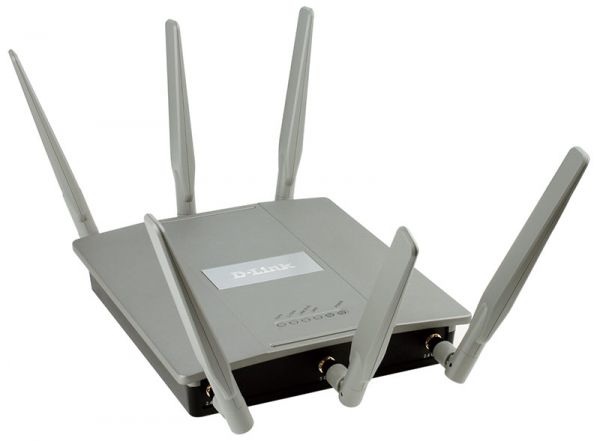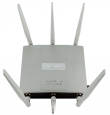
DAP-2695Project
AirPremier AC1750 Concurrent Dual Band PoE Access Point
Description
The DAP-2695 AirPremier AC1750 Concurrent Dual Band PoE Access Point is designed to support small to medium business or enterprise environments by providing network administrators with secure and manageable dual-band wireless LAN options, and utilizing the cutting-edge speed of Wireless AC.
The DAP-2695 can be used as a standalone device or as a device controlled by the DNH-100 Nuclias Connect Controller. The Nuclias Connect complex solution allows you to simplify the administration of wireless networks and provides enhanced management options, including continuous monitoring and analysis of network activity, automation of equipment configuration tasks, control of performance parameters and network security, etc.
Super-fast Wireless AC Performance
The DAP-2695 delivers reliable, high-speed wireless performance using the latest 802.11ac standards with maximum wireless signal rates of up to 450 Mbps over the 2.4 GHz band, and 1300 Mbps over the 5 GHz band1. This, coupled with support for the Wi-Fi Multimedia™ (WMM) Quality of Service (QoS) feature, makes it an ideal access point for audio, video, and voice applications. When enabled, QoS allows the DAP-2695 to automatically prioritize network traffic according to the level of interactive streaming, such as HD movies or VoIP. The QoS feature can be adjusted through the DAP-2695’s web GUI using a drop-down menu option to select customized priority rules. Additionally, the DAP-2695 supports load balancing to ensure maximum performance by limiting the maximum number of users per access point.
Versatile Access Point Functionality
The DAP-2695 allows network administrators to deploy a highly manageable and extremely robust simultaneous dual-band wireless network. All six antennas on the DAP-2695 are detachable and can provide optimal wireless coverage over either the 2.4 GHz (802.11b, 802.11g, and 802.11n) or the 5 GHz (802.11a, 802.11n, and 802.11ac) band. Enclosed in a plenum-rated metal chassis, the DAP-2695 adheres to strict fire codes for placement in air passageways. For advanced installations, the DAP-2695 has integrated 802.3at Power over Ethernet (PoE) support, allowing this device to be installed in areas where power outlets are not readily available.
Security
To help maintain a secure wireless network, the DAP-2695 supports both Personal and Enterprise versions of WPA and WPA2 (802.11i), with support for RADIUS server backend and a built-in internal RADIUS server allowing users to create their accounts within the device itself. This access point also includes MAC address filtering, wireless LAN segmentation, SSID broadcast disable, rogue AP detection, and wireless broadcast scheduling to further protect your wireless network. The DAP-2695 includes support for up to eight VLANs per band for implementing multiple SSIDs to further help segment users on the network. It also includes a wireless client isolation mechanism, which limits direct client-to-client communication. Additionally, the DAP-2695 supports Network Access Protection (NAP), a feature of Windows Server® 2008, allowing network administrators to define multiple levels of network access based on individual client’s need.
Multiple Operation Modes
To maximize total return on investment, the DAP-2695 can be configured to optimize network performance based on any one of its multiple operation modes: Access Point, Wireless Distribution System (WDS) with Access Point, WDS/Bridge (No AP Broadcasting), and Wireless Client. With WDS support, network administrators can set up multiple DAP-2695s throughout a facility and configure them to bridge with one another while also providing network access to individual clients. The DAP-2695 also features advanced features such as load balancing and redundancy, for fail-safe wireless connectivity.
Network Management
Network administrators have multiple options for managing the DAP-2695, including web (HTTP), Secure Socket Layer (SSL, which provides for a secure connection to the Internet), Secure Shell (SSH, which provides for a secure channel between local and remote computers), and Telnet. For advanced network management, administrators can use the D-Link AP Manager II, or D-View SNMP management module to configure and manage multiple access points from a single location. In addition, the AP Manager II and D-View software provide network administrators with the means of conducting regular maintenance checks remotely, eliminating the need for sending out personnel to physically verify proper operation. Also available is an AP array, allowing the management of a set of network devices as a single group for easy configuration and deployment. In addition, the DAP-2695 has a wireless scheduler feature, which turns off wireless functionality when it isn’t needed, saving power. With simultaneous dual-band functionality, PoE support, extensive manageability, versatile operation modes, and solid security enhancements, the DAP-2695 provides small to medium business and enterprise environments with a business-class solution for deploying a wireless network.
General features
Device Interfaces
• 802.11a/b/g/n/ac wireless*
• RJ45 console port
• 2 Gigabit LAN Port (One PoE port supported)
LEDs
• Power
• LAN
• 2.4 GHz wireless
• 5 GHz wireless
Standards
• IEEE 802.11a/b/g/n/ac*
• IEEE 802.3u/ab/at
Wireless Frequency Range
• 2.4 GHz band: 2.4 GHz to 2.4835 GHz
• 5 GHz band: 5.15 to 5.35 GHz, 5.47 to 5.85 GHz**
Antennas
• Three 4 dBi for 2.4 GHz
• Three 6 dBi for 5 GHz
Wireless Speed*
• 802.11a: 6, 9, 12, 18, 24, 36, 48, 54 Mbit/s
• 802.11b: 1, 2, 5.5, 11 Mbit/s
• 802.11g: 6, 9, 12, 18, 24, 36, 48, 54 Mbit/s
• 802.11n:
MCS GI=800ns GI=400ns
20MHz 40MHz 20MHz 40MHz
0 6.5 13.5 7.2 15
1 13 27 14.4 30
2 19.5 40.5 21.7 45
3 26 54 28.9 60
4 39 81 43.3 90
5 52 108 57.8 120
6 58.5 121.5 65.0 135
7 65 135 72.2 150
8 13 27 14.444 30
9 26 54 28.889 60
10 39 81 43.333 90
11 52 108 57.778 120
12 78 162 86.667 180
13 104 216 115.556 240
14 117 243 130 170
15 130 270 144.444 300
• 802.11ac: 6.5–1300 Mbit/s
The Output Power of Transmitter
• IEEE 802.11a:
23 dBm at 6 Mbit/s
23 dBm at 9 Mbit/s
23 dBm at 12 Mbit/s
23 dBm at 18 Mbit/s
23 dBm at 24 Mbit/s
22 dBm at 36 Mbit/s
21 dBm at 48 Mbit/s
20 dBm at 54 Mbit/s
• IEEE 802.11b:
23 dBm at 1, 2, 5.5, 11 Mbit/s
• IEEE 802.11g:
23 dBm at 6-24 Mbit/s
22 dBm at 36 Mbit/s
21 dBm at 48 Mbit/s
20 dBm at 54 Mbit/s
• IEEE 802.11n (2.4 GHz/HT-20; 2.4 GHz/HT-40; 5 GHz/HT-20; 5 GHz/HT-40):
23 dBm at MCS0
23 dBm at MCS1
23 dBm at MCS2
23 dBm at MCS3
23 dBm at MCS4
22 dBm at MCS5
21 dBm at MCS6
20 dBm at MCS7
23 dBm at MCS8
23 dBm at MCS9
23 dBm at MCS10
23 dBm at MCS11
23 dBm at MCS12
22 dBm at MCS13
21 dBm at MCS14
20 dBm at MCS15
23 dBm at MCS16
23 dBm at MCS17
23 dBm at MCS18
23 dBm at MCS19
23 dBm at MCS20
22 dBm at MCS21
21 dBm at MCS22
20 dBm at MCS23
• IEEE 802.11ac (VHT20; VHT40; VHT80):
23 dBm at MCS0
23 dBm at MCS1
23 dBm at MCS2
23 dBm at MCS3
23 dBm at MCS4
22 dBm at MCS5
21 dBm at MCS6
20 dBm at MCS7
19 dBm at MCS8
18 dBm at MCS9
Receiver Sensitivity
• IEEE 802.11a:
-82 dBm at 6 Mbit/s
-81 dBm at 9 Mbit/s
-79 dBm at 12 Mbit/s
-77 dBm at 18 Mbit/s
-74 dBm at 24 Mbit/s
-70 dBm at 36 Mbit/s
-66 dBm at 48 Mbit/s
-65 dBm at 54 Mbit/s
• IEEE 802.11b:
-80 dBm at 2 Mbit/s
-76 dBm at 11 Mbit/s
• IEEE 802.11g:
-82 dBm at 6 Mbit/s
-81 dBm at 9 Mbit/s
-79 dBm at 12 Mbit/s
-77 dBm at 18 Mbit/s
-74 dBm at 24 Mbit/s
-70 dBm at 36 Mbit/s
-66 dBm at 48 Mbit/s
-65 dBm at 54 Mbit/s
• IEEE 802.11n:
2.4 GHz/HT-20
-82 dBm at MCS0/8
-79 dBm at MCS1/9
-76 dBm at MCS2/10
-74 dBm at MCS3/11
-70 dBm at MCS4/12
-66 dBm at MCS5/13
-65 dBm at MCS6/14
-64 dBm at MCS7/15
2.4 GHz/HT-40
-79 dBm at MCS0/8
-76 dBm at MCS1/9
-74 dBm at MCS2/10
-71 dBm at MCS3/11
-67 dBm at MCS4/12
-63 dBm at MCS5/13
-62 dBm at MCS6/14
-61 dBm at MCS7/15
5 GHz/HT-20
-82 dBm at MCS0
-79 dBm at MCS1
-77 dBm at MCS2
-74 dBm at MCS3
-70 dBm at MCS4
-66 dBm at MCS5
-65 dBm at MCS6
-64 dBm at MCS7
5 GHz/HT-40
-79 dBm at MCS0
-76 dBm at MCS1
-74 dBm at MCS2
-71 dBm at MCS3
-67 dBm at MCS4
-63 dBm at MCS5
-62 dBm at MCS6
-61 dBm at MCS7
• IEEE 802.11ac:
VHT20
-82 dBm at MCS0
-79 dBm at MCS1
-77 dBm at MCS2
-74 dBm at MCS3
-70 dBm at MCS4
-66 dBm at MCS5
-65 dBm at MCS6
-64 dBm at MCS7
-59 dBm at MCS8
-57 dBm at MCS9
VHT40
-79 dBm at MCS0
-76 dBm at MCS1
-74 dBm at MCS2
-71 dBm at MCS3
-67 dBm at MCS4
-63 dBm at MCS5
-62 dBm at MCS6
-61 dBm at MCS7
-56 dBm at MCS8
-54 dBm at MCS9
VHT80
-76 dBm at MCS0
-73 dBm at MCS1
-71 dBm at MCS2
-68 dBm at MCS3
-64 dBm at MCS4
-60 dBm at MCS5
-59 dBm at MCS6
-58 dBm at MCS7
-53 dBm at MCS8
-51 dBm at MCS9
Security
• WPA-Personal
• WPA-Enterprise
• WPA2-Personal
• WPA2-Enterprise
• WEP 64/128-bit encryption
• SSID broadcast disable
• MAC address access control
• Network Access Protection (NAP)
• Internal RADIUS server
Network Management
• Telnet
• Secure Telnet (SSH)
• HTTP
• Secure HTTP (HTTPS)
• Traffic control
• SNMP
• D-View module - private MIB
• AP Manager II***
• AP Array***
• Nuclias Connect****
Supported Features
• WMM
• Multi-SSID
• VLAN
• Wireless intrusion
• Internal RADIUS server
• ARP Spoofing prevention
• Bandwidth optimization
• Captive portal
• DHCP server
• MAC address access control
• Band Steering
Dimensions
• 190 x 36.5 x 198.8 mm
Weight
• 1140 grams with antennas
Operating Voltage
• 48 V DC +/- 10%, or 802.3at PoE*****
Maximum Transmit Output Power
• FCC at 2.4 GHz: 27.5 dBm (with 3 streams)
• ETSI at 2.4 GHz: 15.5 dBm (with 3 streams)
• FCC at 5 GHz: 27.5 dBm (with 3 streams)
• ETSI at 5 GHz: 24.5 dBm (with 3 streams)
Maximum Power Consumption
• 18.03 Watts
Temperature
• Operating: 0° to 40°C
• Storage: -20° to 65°C
Humidity
• Operating: 10% to 90% non-condensing
• Storage: 5% to 95% non-condensing
Certifications
• FCC
• IC
• CE
• UL
• Wi-Fi® Certified
* Maximum wireless signal rate derived from IEEE standard 802.11 and draft 802.11ac specifications. Actual data throughput will vary. Network conditions and environmental factors, including volume of network traffic, building materials and construction, and network overhead, lower actual data throughput rate. Environmental factors will adversely affect wireless signal range.
** Please note that operating frequency ranges vary depending on the regulations of individual countries and jurisdictions. The DAP-2695 may not support the 5.25-5.35 GHz and 5.47-5.725 GHz frequency ranges in certain regions. This product is based on draft IEEE 802.11ac specifications and is not guaranteed to be forward compatible with future versions of IEEE 802.11ac specifications. Compatibility with 802.11ac devices from other manufacturers is not guaranteed. All references to speed and range are for comparison purposes only. Product specifications, size, and shape are subject to change without notice, and actual product appearance may differ from that depicted herein.
*** Not supported by FW v. 2.00-r131 and above.
**** Supported by FW v. 2.00-r131 and above.
***** Only compliant with 802.3at PoE switches, the 802.3af PoE standard cannot supply a sufficient amount of power for the DAP-2695.
Certificates
Order info
DAP-2695/A1A AirPremier AC1750 Concurrent Dual Band PoE Access Point


